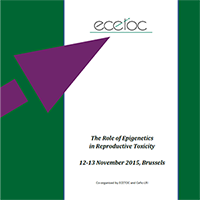Workshop Report no.30: The Role of Epigenetics in Reproductive Toxicity
In a Nutshell
Brussels, August 2016 Epigenetics is a term used to describe relevant biological processes for the regulation of gene transcription in cells which are not associated with changes in the DNA sequence or alterations in the genetic code itself. Thus epigenetics can change a cell without changing the genetic code. For example all cells in the body have the same genetic code but some become specialised skin cells, liver cells, brain cells etc. The epigenome decides this cell specialisation by controlling gene silencing and activation and defining where and when their expression takes place. Thus epigenetic change is a normal and healthy process occurring throughout life and is responsible for an organism’s ability to adapt to a changing environment. However, external factors might influence or disturb these processes and if epigenetic changes occur in an abnormal fashion, they may result in disease. Building on the success of an earlier ECETOC workshop in December 2011: Epigenetics and Chemical Safety (See ECETOC Workshop Report no.23), this November 2015 workshop brought together scientists from around the world to discuss and explore if environmental exposure-induced epigenetic changes that occur during foetal development in utero as a response to external factors such as chemical exposure, might be responsible for diseases in adults. The ability to understand and measure epigenetic changes occurring in the developing embryo offers the possibility of predicting and preventing disease states in later life. Experts from a range of disciplines including epidemiology, toxicology, epigenomics and regulatory science met over two days ― first to share knowledge and then to brainstorm research needs in the field. The Workshop offered ideas and suggestions for applied research to address this question. These are being pursued through the CEFIC Long Range Research Initiative (LRI). The findings of the Workshop have been published as ECETOC Workshop Report no.30: The Role of Epigenetics in Reproductive Toxicity. READ ONLINEThis workshop explored the current state of the science on epigenetics and its role in reproductive toxicity. Experts from a range of scientific disciplines met over two days to share knowledge and brainstorm research needs in the field.
Outcome
Participants outlined a roadmap for the practical use of epigenetic investigations in the regulatory context.
The next step in furthering our understanding of the relationship between epigenetic change and adverse effects is to identify strong, reproducible, apical endpoints for use in models to investigate mechanisms of toxicity in vivo. Too many existing studies demonstrating epigenetic effects are of limited value because they are not reproducible and confidence in their findings is low (see talks by LaRocca, Greally, Gray, and Buesen).
Focus should be on investigating somatic effects, effects in single generations or between parent and child (i.e. intergenerational). There is little value in studying transgenerational effects at this time. These studies should be complemented by validated in vitro models to provide mechanistic information, elucidate questions around causality, and possibly lead to the development of epigenetic markers. Further, best practice guidance should be produced and disseminated so that epigenetic studies yield high confidence, high interpretability and high reproducibility.
The voluntary augmentation of current regulatory guideline studies could enable the better use of animal tissues for retrospective analysis of apical endpoints potentially associated with epigenetic mechanisms, however this will be difficult to put into practice as the benefit of epigenetics measurements is not yet known.
Three concrete research proposals, including possible model systems, were outlined for future action.
Reference
ECETOC Workshop Report no.30 The Role of Epigenetics in Reproductive Toxicity 12-13 November 2015, Brussels (Published August 2016)
